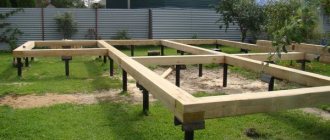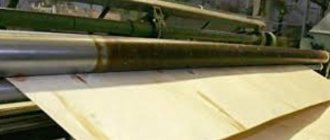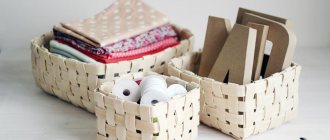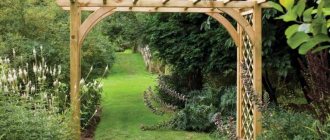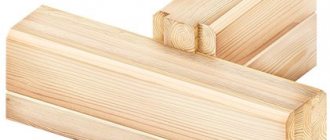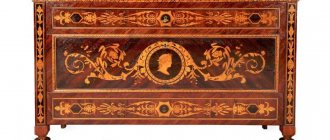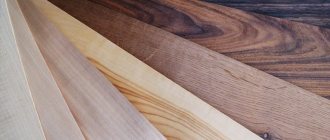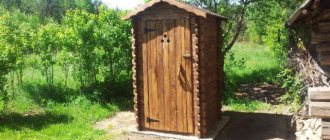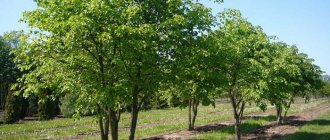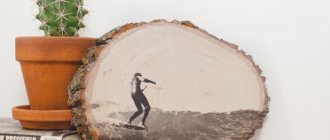Beautiful and elegant wooden kitchens are suitable for various types of interiors and look very expensive. But they cost accordingly. A modern alternative to solid wood is the use of veneer.
At first glance, veneered kitchens cannot be distinguished from sets made of natural wood.
In this article, we suggest looking at a selection of photos of various kitchens using veneer and understanding the features of this material.
Veneer can be very diverse.
What is veneer?
Veneer, or veneered MDF, is finely divided boards covered with a thin layer of natural wood up to one millimeter thick. Due to the fact that MDF shavings are impregnated with paraffin or linguine and then pressed under the influence of temperature, the panels are durable and can withstand harsh operating conditions in the kitchen.
A thin cut of natural wood provides a beautiful appearance and is similar in appearance to natural wood. It is glued onto MDF and then coated with varnish or a special paint coating.
Thanks to the protective layer, this headset is very durable
At the same time, veneer can be very diverse: different shades and patterns of wood decorate both traditional and modern kitchens.
Color Features
The oak veneer palette includes colors from light straw to dark red; all sand colors interspersed with grayish, greenish, light brown. The color greatly depends on the age of the tree (the older it is, the richer the color), on growing conditions, processing technology, etc.
The drawing is specific with wide, well-defined smooth lines.
Oak veneer is almost never found in its natural color, since for greater expressiveness and attractiveness it is usually stained
Preparation method
It is important to understand that veneer facades are also different. A lot depends on the manufacturing method. In total, there are three methods for producing veneer panels.
Depending on the manufacturing method, different types of veneered kitchens are obtained
The most common method is peeled veneer. For it, a special peeling machine is used, which cuts the logs using a special technique, in a spiral. At the same time, manufacturers strive to select the most beautiful wood with unusual patterns.
The thickness of the veneer sheet is regulated directly by the master and it can range from 0.3 to one and a half millimeters. Mass production made such veneer affordable. The unusual appearance also adds to the attractiveness - the machine allows you to preserve the structure of the wood and its characteristic stains.
This method allows you to preserve the texture of wood even on the thinnest layer of veneer
For sliced veneer, special types of saws and wood are used. It is noteworthy that this particular technique makes it possible to process the most valuable types of wood - mahogany, alder, oak. Different directions of the cutting edge allow you to emphasize the beauty of the pattern and give it texture. This way, graceful and elegant veneered facades are obtained, however, they are quite expensive.
Dark oak veneer panels are made in this way
The sawn method of making veneer is considered one of the most inconvenient. Wood boards are processed with a special plywood saw. However, with this method, a lot of wood is used for sawdust, so the cost of manufacturing it is much higher than in the two previous cases. The method is used because it helps preserve the beauty and characteristic pattern of coniferous wood.
Light pine wood is best treated this way.
Types of veneer and manufacturing technology
Veneer is divided into 3 types: fine-line, natural and dyed. The first type creates an imitation of a valuable species from inexpensive tree species. Popular due to its low price and appearance. Natural veneer fully reflects the texture of wood and is seamless. It is environmentally friendly and looks beautiful in the interior. The color coating is created in 2 stages. First, the surface is painted and then treated with stain. Rolled veneer is used to process the edges.
According to the manufacturing principle, the material is:
- peeled;
- planed;
- sawn
In the case of peeling, the surface layer is cut off from the beam during rotation. Almost all wood species are suitable. The top layer is removed in a spiral. The output is flexible veneer in the form of large-area sheets with a barely noticeable pattern. The peeled coating is applied to the plywood.
Planing is used for hard trees. The cut is made longitudinally or transversely to the board. Using this method, a dense veneer with a pronounced texture is obtained. Planed coating is used for interior doors and furniture.
Sawing is the most expensive processing method. The production process leaves a lot of waste. The principle of operation is to saw thin sheets from logs.
Veneered coating can be tangential or radial.
Facade type
Like most non-monolithic kitchens, veneer fronts come in different shapes. A solid facade will be cheaper - in fact, it is a simple panel covered with veneer on all sides. It looks beautiful and externally such surfaces resemble solid wood.
However, you should use them carefully in the kitchen: veneer may be thin, but it is still wood. This means that it has all the disadvantages and can be blown away and deformed from contact with water and constant temperature changes. If the facade is covered with veneer carelessly, it is unlikely to serve you for more than a couple of years.
The solid veneer facade looks beautiful, but it is not particularly durable
A framed or paneled veneer façade will cost you a little more. In this case, the panel is covered with veneer, and the edges are trimmed with metal, plastic or treated wood. Of course, they are not too cheap. However, such a frame reliably protects the surface from drops of water and grease getting under the veneer, which means the set will last you much longer.
A set with a frame will cost more, but will also last longer.
Material properties
Doors made of ash are often compared to oak - this wood is so durable. In addition, ash is distinguished by certain qualities:
- very high fiber density;
- it does not crack or dry out over time;
- resistant to rot and temperature;
- environmentally friendly, does not emit toxins and has no unpleasant odor;
- not subject to drying out and rotting.
Despite their amazing strength, it is not recommended to make entrance doors made of ash without certain protection - this wood reacts negatively to constant exposure to moisture. Typically, ash doors are used only if the house or apartment is equipped with double doors: an external entrance, most often metal, and an internal one leading to the apartment.
For the same reason, a poor reaction to water, an interior door in a bathroom will require mandatory treatment with special impregnations to protect it from moisture.
Advantages and disadvantages
Like any other facades, veneered ones have both advantages and disadvantages. We suggest you study this aspect in detail so that you know what problems you are likely to encounter.
Veneered kitchens look stylish and have a lot of advantages
- No matter how high-quality plastic or PVC film is, they can only imitate wood . This means that upon closer inspection the fake will be noticeable. Veneer is completely natural wood, albeit very thin. Even with meticulous study, high-quality veneer facades are indistinguishable from kitchens made of solid wood.
- If the veneer is treated with varnish or a special paint coating, it will be resistant to any of the most unpleasant influences that occur in the kitchen - high temperatures, mechanical damage, moisture and steam, drops of fat and various acids.
- Like any wood, veneer can be restored. Of course, we are not talking about serious damage - in this case you will need to install a patch. However, small scratches and abrasions can be easily hidden and the kitchen restored to its original appearance.
- It cannot be denied that veneer facades look truly luxurious. A set made of solid wood looks exactly the same, but costs several times more.
- The material is environmentally friendly, does not contain harmful impurities and is non-toxic to humans even when heated. This means that veneered facades can be installed even in close proximity to the stove - there will be no toxic fumes that often occur with plastic or PVC film.
- Caring for veneer kitchens is very simple : just wipe them regularly with a damp sponge and then wipe dry. Some people use special polishes that add shine to surfaces. However, in the kitchen we recommend avoiding such products: they attract dust and other debris, which means maintenance becomes more difficult.
However, if you thought that a veneered kitchen was the ideal solution, we will disappoint you.
- It is almost impossible to visually determine the quality of veneered furniture . This means that if you were sold a not very high-quality headset, you will most likely find out about it already in the process of using it. You can avoid the problem if you contact only trusted furniture stores and craftsmen who value their reputation.
- The problem stemming from the previous drawback is the low quality of some veneered kitchens. Veneer can become deformed, peel off... This happens due to the influence of moisture, fat, steam and constant temperature changes. Therefore, we emphasize once again that you should not save on buying a kitchen set.
- In any case, its cost will be higher than that of film or plastic facades. However, you pay for a spectacular appearance, quality and environmental friendliness.
- Like any wood, veneer does not tolerate direct sunlight very well. Under their influence, wood can darken and change shade. This can be avoided by varnishing the veneer. We strongly do not recommend leaving it without a protective coating.
As you can see, most of the disadvantages of veneered kitchens can be avoided if you purchase high-quality sets from trusted places. As for expenses, if you have a good kitchen, they will pay off very quickly.
In general, we strongly recommend veneered kitchens: they are worth it!
Tips for selection and care
When choosing veneered furniture, the following main criteria are important:
- price;
- environmental friendliness;
- durability and wear resistance;
- aesthetic qualities;
- maintainability.
An important point is the design of the room. Modern artificial materials are excellent for implementing bold design projects, providing an unlimited range of shades, textures, and patterns. Natural material is perfect for classic room designs, combining the beauty of natural wood and the environmental friendliness of natural materials.
Natural materials require careful care without the use of aggressive chemicals.
It is enough to wipe such surfaces with a cotton rag using a soap solution. Artificial analogues are not so capricious to care for. But it is necessary to use cleaning products without abrasives, alkalis, or solvents.
Veneer color palette
If you think wood is a boring and monotonous material, then you are absolutely wrong. A wide variety of types of wood are used for veneer, which allows us to provide customers with a wide range of coatings of the most unusual appearance.
Veneer kitchens can be very diverse
Luxurious oak facades will suit both classic and modern interiors. Oak wood can have different shades, but its characteristic feature is its unusual rounded patterns that add gloss and nobility to even the simplest furniture.
Black oak veneer kitchen - for lovers of expensive elegance
Alder veneer is distinguished by its delicate, light color and velvety-looking texture. It is perfect for kitchens in country style, Provence. Another advantage of alder is its high resistance to mechanical stress. Very often, such a coating is not even varnished, since it already tolerates moisture and temperature changes very well.
Alder is ideal for most interiors.
A set with a rosewood facade will cost you quite a lot. However, unusual patterns and textures of wood are definitely worth the expense - the kitchen will look truly luxurious and elegant.
The peculiarity of cherry veneer is its reddish tint. It is perfect for a Baroque style kitchen. Moreover, cherry panels do not fade over time, but, on the contrary, the shade becomes much deeper and more noble.
The peculiarity of a cherry kitchen is its deep color
The cool, light shade of ash is ideal for small kitchens or south-facing spaces. Ash must be treated with varnish or a special protective coating, otherwise the color very quickly becomes dull, losing its charm.
Walnut veneer has a rich structure. Depending on the type and age of the tree, the shade may vary, but always remains consistently warm. Such facades will decorate kitchens facing north and will slightly dilute the lack of light.
Walnut kitchens are always distinguished by warm tones
A fashionable way to process veneer is zebrawood. The unusual striped color looks very expensive and unusual, and therefore will suit both classic and modern interiors.
Zebrawood is a modern and very fashionable type of veneer
As you can see, choosing the right option for a veneered kitchen is not difficult - the main thing is to find the type that you like.
Veneered kitchens are easy to find to suit every taste
In addition, you can radically change even the appearance of the familiar alder by applying a special varnish or protective coating to the facade. Depending on your choice, veneer can acquire a matte or glossy texture. The first option is ideal for classic kitchens - it looks elegant, restrained and rich. Shiny glossy options will fit well into modern interiors and visually enlarge a small kitchen.
The glossy structure is suitable for modern interiors.
Matte veneer looks very noble
Suitable tree species
There are more than 250 wood species used for veneer production. Widely used:
- Birch is a natural material that is easily tinted and painted. Natural colors are pale yellow, gray and light brown. The texture is uniform, due to the absence of visible growth rings. Interior doors are made of birch. It is important to maintain moderate humidity in the room.
- American cherry is a man-made material that is distinguished by its brown-red hue and fibrous texture. It is easily polished and serves as a material for exclusive orders.
- Walnut - grows in the eastern United States. It has a characteristic dark color. European walnut is lighter in color.
- White oak is a textured veneer of natural origin, characterized by high strength. It serves as a material for flooring, doors and furniture. The color is sandy and pale brown.
- Pine is an economical type of material. Most often used in furniture production. It is soft, uniform and light. It can be easily bent. Pine has low wear resistance. The advantage is resistance to fungi.
- American maple is a durable veneer with a subtle pattern. Has a wide range of colors. Used for floor covering.
- Bubingo is a premium decorative veneer. The color can be either brown or red with a purple tint.
- Anegri - used for making furniture. An analogue of bamboo wood is available in several colors - sandy with shine, brown, white-brown. African wood veneer can be polished and painted.
- Makore is a type of mahogany tree. It is distinguished by high quality and rich textures. It is used to create door coverings and furniture veneers.
- Wenge is an elite veneer of natural origin. It has a noble coffee shade of design on a light background. The characteristics of wenge veneer are flexibility and strength. Able to withstand high pressure and load.
Decor
Despite the fact that veneer itself is a material with a smooth structure, very often veneered kitchens are decorated with various decorative elements. For example, carved elements made of natural wood. They significantly increase the cost of your kitchen, but the appearance only benefits from it.
Curly veneer facades are expensive, but the appearance is stunning
Often, various ornaments are used as decoration for veneered kitchens: ethnic, floral, geometric motifs. We recommend choosing depending on the design style of your kitchen.
And sometimes the texture of the wood itself becomes a decoration
If you have a small kitchen, voluminous decorative elements may not be very appropriate: they will visually make the room even smaller. However, in this case, you can experiment with different textures. For example, a special primer helps to visually age the set - an excellent solution for classic kitchens or baroque-style rooms.
Aged veneer - another fashionable technique
As an option, try choosing a suitable shade and applying a patina. It makes even the simplest set look elegant and expensive.
With patina, veneer looks more noble
How to care
When it comes to maintenance, veneer is not too demanding, but it has its own characteristics. It is necessary to take into account that this is, first of all, natural wood, so an appropriate approach is needed.
To prevent the kitchen from losing its appearance, you need to take care of it
For daily care, a soft sponge or lint-free cloth will be enough. Wet them in water and then wipe the surface. After this, wipe dry with a soft towel. If there are stains or stains in the kitchen, you can use a soap solution or a special wood cleaner.
It’s not difficult to clean veneer if you don’t start cleaning
If you decide to use polish, you will need to degrease the surface first. To do this, you can use a weak solution of alcohol or, if desired, a regular window cleaner. Gently wipe the set, wipe it dry, and then apply polish and let it dry.
Important! Never use abrasive detergents or hard sponges. They will scratch the surface and you will need to spend effort and money on restoring the headset.
Reviews about veneered kitchen
Especially for you, we have collected several reviews from users of veneer sets. We are sure that after reading them, you will easily make a decision and understand whether you want to purchase such a kitchen.
The advantage of veneer is that abrasions do not spoil it, but, on the contrary, add charm.
Veneer is a simple and easy-to-maintain material that does not require special care.
The main thing is to at least occasionally wipe the veneer from dust and dirt.
Choose a high-quality kitchen and there will be no problems.
Peeling varnish is easy to renew, but durability is a definite plus.
Advantages of sonoma oak
There is increased consumer demand for the manufacture of interior items in the Sonoma oak shade. The furniture will be distinguished by functionality and versatility, suitable for many finishing materials. Before purchasing furniture of the required shade, the buyer needs to learn about all the benefits of color. Wood products can be perfectly combined with different shades, materials, and textures. Sonoma oak is great for creating a variety of vibrant contrasts.
Advantages:
- Furniture with a soft shade is characterized by warmth, which can add coziness to any interior.
- Practicality. A light shade can mask various contaminants, such as dust.
- Visual increase in space.
- Nobility.
- Combination with different shades of furniture.
We invite you to familiarize yourself with the tips of designers, with the help of which you can advantageously emphasize the shade of furniture and make it advantageous. This can be done using basic items:
- Combine furniture sets with bright shades of the walls; against their background, light and dark tones will look aristocratic.
- Use glass elements to play with light.
- Focus on height. It is recommended to give preference to narrow cabinets and open shelving.
- Interior items with mirror elements, making it possible to expand the space.
- Light shades compensate for the lack of sunlight entering the room.
- A play of contrasts thanks to the combination of dark and light shades of furniture. Chocolate color looks especially good when decorating cabinets.
Sonoma oak shades have many advantages, which is why it is so popular among manufacturers and consumers.
